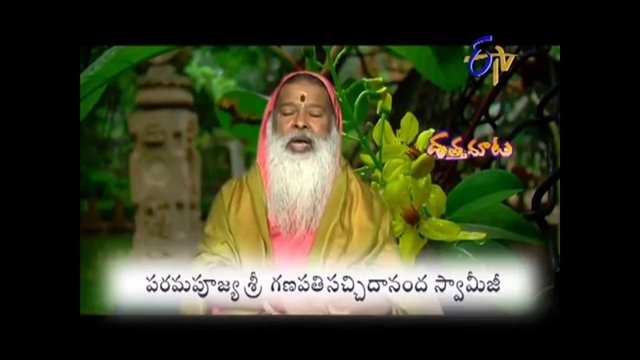
Bhagavadgītā kiñcidadhītā gaṅgā jalalava kaṇikā pītā |
Sakṛdapi yena murārī samarcā kriyate tasya yamena na carcā || 20 ||
Meaning - The person who has read at least a bit of the Bhagavad Gita, who has sipped at least a drop of water once from the River Ganga, who has at least once worshipped Lord Hari (Murari) and obtained satisfaction from such worship, will not have to face any altercation with Yama, the Lord of death. It implies that such a person will not reach hell (naraka).
To lead a good life is the natural desire of every being. From our elders we gain the knowledge that, to lead such a life, there are certain specified procedures to be followed. This stanza lays the emphasis on the unflinching devotion (drdha bhakti) that is needed. By leading a pure life, the living being can conquer death itself! He will become Mrutyunjaya i.e. he will be totally absolved from the fear of death.
In this stanza, three points are being stressed upon- 1) Reading the Bhagavad Gita 2) Drinking water of Ganga and 3) Offering devotional worship to Krishna.
Retaining Arjuna as a tool, Lord Srikrishna preached His divine message to the world in the form of Bhagavad Gita. In the words of Sri Shankara Bhagawad-pādācharya, the Bhagavad Gita contains the essence of all the teachings contained in the Vedas. The Upanishads are the cows. Paramatma Sri Krishna himself milks these cows. Arjuna is the calf. The milk is the great nectar called Bhagavad Gita. As such Bhagavad Gita is referred to as an Upanishad in itself. The wise drink this milk called Bhagavad Gita. Padma Purana emphatically states that picking any one shloka from the Bhagavad Gita and reciting it with full faith and dedication will in itself pave the way towards liberation.
The significance and sanctity of River Ganga is well known. It originates in the Himalayas and carries with it innumerable medicinal properties. This divine river actually descends from Heaven on to the head of Shiva, then flows on earth and finally reaches the lower planetary systems known as Patala. Our Puranas state that as a result of Emperor Bhagiratha’s intense penance, the divine River Ganga, which was flowing in heaven, descended to earth to bless his forefathers. She flowed over the ashes of the sons of King Sagara and thus blessed them with liberation. ‘Vishnu paadodbhava Ganga’- Ganga originates from the feet of Lord Vishnu. Such is the sacredness of this river. For this reason, even today, the practice of immersing the ashes of the deceased into the Ganga is prevalent.
It is said that in this Kali Yuga, the person who dies in Kashi will be blessed with liberation- the reason being the presence of both Kashi Vishveshwara and River Ganga at that place. Even calling out to her ‘Ganga, Ganga’ from a great distance, bestows great merit (punya).
The third point is the worship of God. Worship gradually washes away the person’s ego and purifies the mind. It lights the lamp of knowledge in the person and thus becomes a cause towards attaining liberation. When any one of the 9 forms of devotion is selected and prayers are earnestly offered to God through that, then attaining liberation becomes even simpler. In His hymn composed upon Lord Lakshmi Nrusimha (Lakshmi Nrusimha stotram), Sri Shankaracharya stresses upon the greatness of devotion.
If someone decides to move contrary to this, then you can imagine what his fate would be. It is said that upon death when the being, who had lived all life without any devotion towards the Supreme Lord, reaches hell (naraka) and is undergoing intense pain and suffering, it hears the voice of Lord of death (Yama)- ‘O being, while you were on earth, why did you not think of Lord Srihari (Vishnu), who dispels all troubles/ ills? Had you worshipped Him with faith, even once in your lifetime, you would not have to undergo so much suffering’. This is the compassion of Lord Yama. At least at that point of time, he reminds the being about worshipping the Supreme.
Om Govindaya Namaha!!
Downvoting a post can decrease pending rewards and make it less visible. Common reasons:
Submit
Om Govindaya Namaha 🙏🏻🌺🌺🌺
Downvoting a post can decrease pending rewards and make it less visible. Common reasons:
Submit
Om Govindaya Namaha 🙏🏻
Downvoting a post can decrease pending rewards and make it less visible. Common reasons:
Submit
Om Namo SriKrishna Parabrahmane Namaha 🙏🏻
Downvoting a post can decrease pending rewards and make it less visible. Common reasons:
Submit
Om Namo Narayanaya 🙏🏻🌼🌼🌼
Downvoting a post can decrease pending rewards and make it less visible. Common reasons:
Submit
JGD Om namo Narayanaya
Downvoting a post can decrease pending rewards and make it less visible. Common reasons:
Submit
Harihi 🕉 Tat Sat 🙏🏽 🌹
Downvoting a post can decrease pending rewards and make it less visible. Common reasons:
Submit
Jgdh Appaji!!! Thank You for telling us the power of Gita, Ganga Gayatri... Sri Hari!!!🙏🙏🙏
Downvoting a post can decrease pending rewards and make it less visible. Common reasons:
Submit